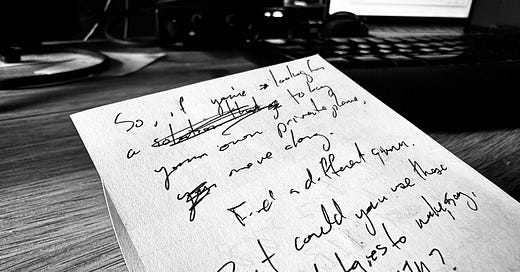Last week, I was struggling to write a sentence.
Despite the decade I’ve spent writing professionally (from journalist to tech writer to educator to author… and from speech writer to blogger to editor to copywriter) this is shockingly common.
I write for a living. I still find it difficult to write sentences I’m pleased with.
So, today we’re doing something a little weird. I thought it might be helpful to show you my step-by-step process for editing ONE SINGLE sentence.
Be warned, what you’re about to read is a live peek at a writer’s brain…
It is a dark and scary place.
I write this sentence:
I read it and think “this feels wrong.”
Whenever that thought stabs at my consciousness, I strip down the individual elements of whatever I’m looking at. My first move is to break this single sentence apart into separate sections using shift +enter.
I’m fine with the opening phrase (“I could have been”) so I immediately drop down. This sentence demands parallel structure, so I look at the verbs first.
This works. Each word has three syllables and ends with “-ing.” Although their stressed syllables do not match (TUM-te-te, and then te-TUM-te), I’m okay with it.
I stare at the middle section of each phrase.
Ugh.
Even before I count the syllables in these two phrases, I know they aren’t right. Stacking the phrases on top of one another has helped me see the two descriptors don’t match. “Plump treat baskets” has 4 syllables while “high-level strategy plans” inflates to 7.
I think: “What’s a phrase with fewer syllables that means something similar to high-level strategy plans?”
I change the line…
Okay the additional M in “moves” helps that alliteration in “make millions,” but I think I can do a little better. There’s something fun about the rhythm of that first phrase about baskets (TUM-TUM-TUM-te) that loses a little steam in the second (TUM-TUM-te-te-TUM).
Maybe it’s just the word “plump” that I love.
Plump.
Plump.
Plump.
It sounds like itself. Majestic. I should use plump more often.
Wait, what was I doing?
Oh right. Trying to find word better than plump.
(Plump chance.)
Let’s try…
“Sharp new tactics” matches the rhythm of “plump treat baskets,” and as an added bonus, the new assonance between “tactics” and “baskets” makes me drool a little.
But.
Now I’m doubting another part of the sentence. “Design” doesn’t work as well with “sharp new tactics.” Do you really “design” a sharp new tactic? More likely you’d “discovering” it, but “discovering” has four syllables. Darn. Also, this sentence is about my addiction to compliments, but “discovering” is an act nobody would see.
I try another tweak…
Oops. Although “Sharing” and “sharp” are now alliterative, but now the two -ing verbs have a different number of syllables. Do I care? Sometimes, no. This time, yes.
I don’t want to change “sharing,” though, so I make a different swap.
My brain is hurting, but I’ve got to address the final adjective and noun. By the grace of Caliope (or pure dumb luck), a matching phrase pops into my head immediately.
I getting close to committing the sin of OVERworking a line, which is why I’d rather have the springy alliteration from “raise revenue” than match the syllable structure with something like “increase revenue.”
Besides (I remind myself), this is nonfiction, not poetry. Our sentence will be parsed back out to a full line, which makes the syllable mismatch less overt.
All done.
Except I’m not.
Damn it.
I notice an issue with my infinitives at the end of each phrase that keeps me from quitting and going to breakfast. It happened when I rolled out “raise revenue.”
Do you see the problem?
“to hungry coworkers”
“to raise revenue”
In the first version, I’m giving a (noun) to an (adjective)(noun). In the second, I’m sharing a (noun) in order to (verb) (noun).
Will there be riots in the street because of this? Probably not.
Is it worth the change? Yes.
The whole goal of editing is so we leave zero friction between our idea and the reader’s understanding. At the very least, I’d like to have the same category of noun (people) at the end. It makes for easier reading.
I dive back in…
The astute reader will notice the structures are not identical, but that reader can also bugger off. I need pancakes.
(12 pancakes, 3 strips of bacon, and one egg later…)
It’s worth mentioning I don’t do this for every sentence I write.
Can you imagine? My wife Kate would come home one day to find me curled up in the fetal position on the floor of my office, clutching a battered style book, frothing at the mouth, and babbling something about the gross mistreatment of the oxford comma.
Usually, these surgeries take place within a line at the beginning or end of a post. If I grab a person when they start reading and leave them wowed once they finish, I’m doing my job.
And if you’re giving even half this attention to the words coming off your fingers, you’re doing yours.
What Makes Great Writing? is a publication specifically for people who want to improve their writing.
It is NOT for people who want to
Hack the process,
Replace themselves with AI,
Find “super quick tips.”
If you’re in the first group, subscribe. If you’re in the second, begone foul beast.
















How about famished coworkers?